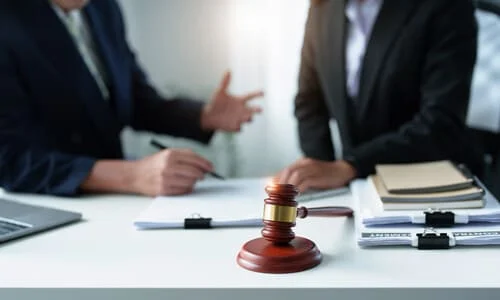Book a Consultation
Find out why so many clients appreciate the amount of work we put into their case.
"*" indicates required fields
Call 24/7
 The first step in a wrongful death lawsuit is to contact a Salt Lake City wrongful death lawyer. Your attorney will talk with you about your loved one’s death and help you answer several important questions:
The first step in a wrongful death lawsuit is to contact a Salt Lake City wrongful death lawyer. Your attorney will talk with you about your loved one’s death and help you answer several important questions:
We’ll do our best to give you an accurate estimate based on the information we have, but it’s helpful to understand that some elements of a lawsuit may take more or less time due to circumstances beyond our control.
For example, how quickly we can get a court date to argue a motion can vary depending on how busy the court is. Sometimes, it might take a few weeks, and other times, it could be a few months.
We’ll also advise you that most wrongful death lawsuits are ultimately settled out of court, and the time it takes to negotiate a fair agreement is also variable.
Sometimes, the defendant or their insurance company is more agreeable to meeting the client’s terms, and then the process may go more quickly. If the other party is unwilling to compromise or to reach an equitable deal, it may take more time.
In a few cases, the other side simply won’t agree to a reasonable offer, and we proceed to trial, which is usually the most time-consuming process. Some cases take two years or more to conclude, but others may resolve earlier.
Under Utah law, the personal representative of the decedent’s estate or one of the decedent’s heirs can file a claim.
If there is a surviving spouse, they will usually file the claim. If not, the deceased person’s children or parents may make a claim.
Minor stepchildren may have a case if they rely on the decedent for financial support. If none of those relatives survived the decedent, other blood relatives might have a claim in accordance with the state’s inheritance laws.
In most cases, you have two years from the date of the death to file a claim. However, we urge you not to wait – your attorney will need to prepare a strong argument before filing your claim. In many situations, we need to spend time investigating the death and gathering evidence, so it’s best to contact a lawyer sooner rather than later.
Your attorney will review the circumstances of your family member’s passing and help you determine if there is evidence of a wrongful death. In general, a wrongful death is usually the result of another party’s negligent or intentional act.
Here are some examples of situations that may qualify as wrongful death:
Car accidents are the most frequent cause, but we also see situations involving boats or drowning, planes, golf carts, ATVs or other low-speed vehicles, pedestrians, motorcyclists, bicyclists, and occasionally other transportation accidents.
The key factor is whether we can find evidence that another party’s negligence caused the accident. There is generally a police report for any kind of accident that results in a death, so we will start there.
If the report indicates another driver or party was at fault in the accident, that’s usually a good indication that you probably have a case. If not, we’ll review the report and look for any inconsistencies to determine if further investigation might be helpful.
In some less common situations, a third party besides another driver may be at fault – for example, if the car’s brakes failed, causing the accident, the manufacturer might be responsible.
If your loved one was fatally injured in a public place like a store or restaurant or at a private home, it’s possible the property owner might be liable. Again, we need evidence that the owner’s negligent actions caused the injury.
For instance, if the decedent tripped and fell, suffering a fatal injury, we would investigate to learn more about why they fell.
Was there a hazard on the property, such as a snagged carpet on the stairs, that the owner knew about and failed to fix or warn the decedent about? If so, they may have been negligent.
Losing a loved one to an act of violence can be devastating. Unfortunately, many family members of victims are traumatized a second time when they learn that the perpetrator won’t face any criminal charges or has been acquitted in a trial.
This happens more often than you might imagine because the burden of proof in a criminal case is fairly high – the defendant must be found “guilty beyond a reasonable doubt.” This can halt the criminal process in several different stages.
Sometimes, the police have a suspect but don’t have enough evidence to make an arrest. Even if they do, the district attorney might decline to pursue charges because they don’t believe there is enough evidence to win the case.
Finally, there are some cases where the perpetrator is found not guilty by the jury, even if the district attorney was confident in their case. As a result, there are a number of situations where the decedent’s family members are desperate to find justice but unable to get it from the criminal justice system.
When this happens, they may consider a civil case or a wrongful death lawsuit against the perpetrator.
The burden of proof in civil court is much easier to meet – you only need to show that the defendant “more likely than not” acted in a negligent or willfully dangerous way. A civil case will not result in jail time, but it could punish the defendant financially.
At the same time, the money recovered can be used to make up for medical and funeral bills, lost income, and other economic losses the victim’s family suffered.
In some cases, it may not be feasible to sue the perpetrator, either because they were never identified or because they don’t have sufficient financial assets to pay the judgment. If there is no relevant insurance policy, it might not be possible to recover from the defendant, even if you win the case.
In these situations, we might consider whether there are other liable parties. For example, if the decedent was fatally injured in a mugging, we’ll look at where it happened.
If the decedent was mugged in a grocery store parking lot, we’ll visit the scene to see if the parking lot was poorly lit or if there were other signs of negligent security. If so, you may have a claim against the grocery store.
After your lawyer determines that you’re eligible to file a claim and you have a strong case, they will explain your options.
If you want to proceed with a lawsuit, we’ll continue investigating and compile as much evidence as possible to support your case. Additionally, we’ll calculate all your damages to determine a reasonable amount of compensation.
Next, we’ll file a lawsuit with the appropriate court explaining your damages and how much you’re seeking from the other party. They will have an opportunity to file a response, and sometimes, they may make a counteroffer of a lower sum.
Frequently, these early offers are for far less than your claim is worth, but if you receive one, we will discuss the details with you and answer your questions.
The next phase is called discovery, and it involves both sides exchanging evidence and learning more about the details of the case.
This process can take months. Sometimes, the other side will review the evidence and realize they are likely to lose at trial, which could inspire them to make a new or better offer.
In some cases, the other party simply isn’t willing to agree on a reasonable settlement, and we continue to the pre-trial phase, where we work to prepare for the upcoming trial. Negotiations may continue at this stage if we can’t make a deal earlier.
Much of the time, we’re able to come to an agreement by the end of pre-trial preparations, and there’s no need to go any further.
However, in a minority of cases, the other party still won’t agree to a fair deal, and we move on to trial, where we present evidence, including witness testimony, video or photo evidence, documentation, electronic evidence, and more.
While you don’t have to testify, in some cases, it may be helpful for a jury to hear about your family’s loss directly from you or other relatives. When both sides have presented their cases and made closing arguments, the jury will be asked to make a decision.
If you believe or suspect another party’s negligence caused a family member’s death, please contact Valley Law Accident and Injury Lawyers for a free, confidential consultation. We’ll review your case, answer your questions, and help you understand your options.
Attorney Brigham Richards established Valley Law to assist injured people and their families in recovering the compensation they deserve. He strives to help each client obtain the resources and help they need, and he can serve clients who speak English and Spanish.
Call Valley Law today at 801-810-9999.
Get in touch


2021 and 2022 Gold Winner for Top Law Firm by Salt City Best
Call 24/7 801-810-9999